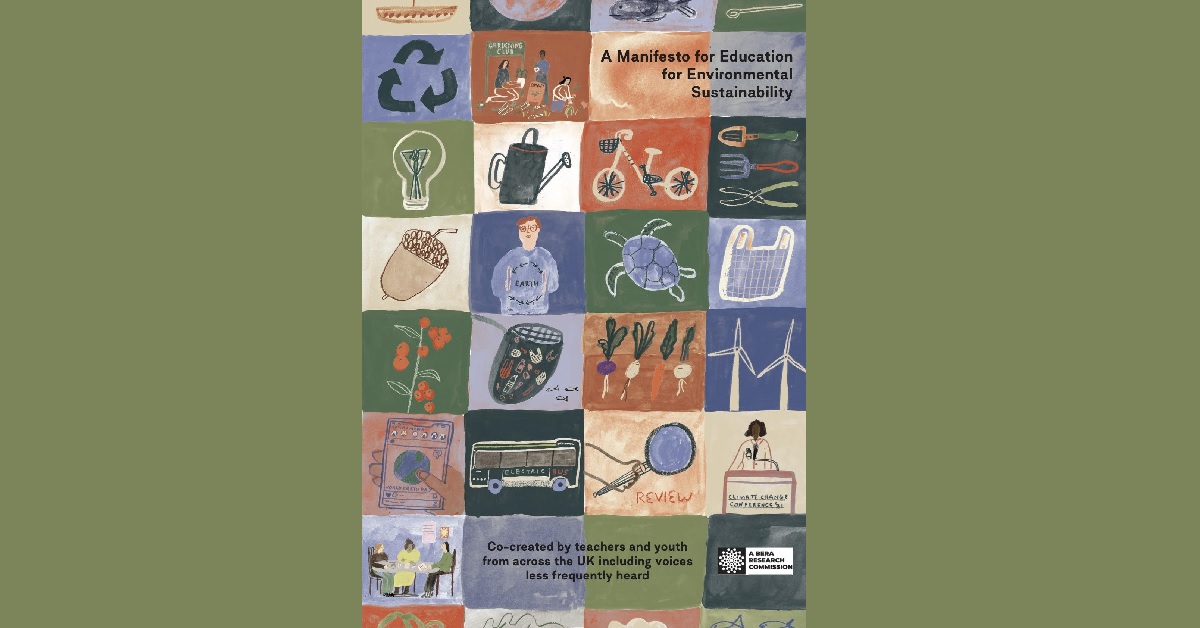Environmental Politics in Education: Making a Manifesto with Young People

Childhood and Youth Studies Research Group blog
Authors: Dr Lynda Dunlop (University of York) and Prof. Elizabeth Rushton (University of Stirling)
The planet is getting hotter. This has dire consequences for humans and other organisms, with flood, fire and drought leading to food insecurity and climate change induced migration. Urgent action is needed now, and education has a key role to play in tackling climate change – from learning about the causes of climate change and how to reduce greenhouse gas emissions to creating capabilities to adapt to the conditions brought about by climate change. At present, however, as the United Nations (UN) notes, education often contributes to unsustainable living through a lack of opportunity for learners to question their own lifestyles and the systems and structures that promote those lifestyles. What would education look like if it prioritised environmental sustainability? This is the question we explored with young people and teachers from across the UK through the BERA Research Commission on Education for Environmental Sustainability.
A manifesto can challenge or provoke at the same time as suggesting positive actions that can be taken forward. It is, in the words of Biesta & Säfström (2011), “an attempt to speak and, through this, create an opening, a moment of interruption”(p.532). Manifestos are a call to unite and demonstrate against dominant systems in order to make change (Brett, 2019). We brought together over 200 young people (aged 16-18), teachers and teacher educators – those with arguably the greatest stake – to create a vision for education for environmental sustainability across the jurisdictions of the UK. The overview of the process of manifesto-making is presented in the video and article and can be summarised as follows:
- Provocation: Inviting and sharing provocations on a range of themes and from a range of perspectives.
- Imagination: Imagining the future of education and how we get there, and sharing these ideas with each other.
- Visioning: Bringing ideas to life through art.
- Manifesting: Presenting these ideas as a manifesto on education for environmental sustainability.
The Manifesto for Education for Environmental Sustainability was launched in November 2021, with invited responses from the artist and Honorary President of the Black Environment Network, Judy Ling Wong CBE, Molly Hucker a youth activist, Lord Jim Knight (a serving member of the House of Lords) and Sarah Roberston, Director of Education and Professional Practice at the Royal Society of Chemistry. The launch aimed to bring the perspectives of young people and teachers shared through the manifesto into conversation with those who can change policy and practice at different levels. The manifesto calls for actions at different levels: in classrooms, schools, communities and at policy level. There was broad consensus that there were significant opportunities to enhance education for environmental sustainability across the UK, particularly where the focus is limited to science and geography lessons. Educational policies which prioritise collective, equitable action, dialogue and positive problem solving were highlighted through the manifesto.
The manifesto challenges the status quo, however the consensual approach means that it focuses on reform rather than transformation, and such approaches are unlikely to maximise the contribution of education in societies’ response to the climate and ecological crises. As Stein et al. (2020) argue:
The predicament we face is not primarily rooted in ignorance and thus solvable with more knowledge, nor primarily rooted in immorality and thus solvable with more normative values; rather, it is rooted in denials that stem from harmful desires for and investments in the continuity of the securities and satisfactions promised by modernity-coloniality. (p. 1).
That said, working with teachers and young people, we have trialled a process for articulating the educational problem and identifying and prioritising solutions which can be translated into educational realities. As one young person commented:
current education systems give limited support- but the capabilities could be massive as you not only teach people about the environmental issues but you’re giving them the knowledge to create solutions
Similarly, a teacher noted that the process had highlighted the need for immediate action at the same time as planning for more structural transformation:
I feel the need to acknowledge that these questions need answering twice: once in terms of working towards a fundamental reworking of the education system for a world where sustainability is an existential issue and not a fringe interest; and again in terms of what we can achieve until such time as fundamental reform is delivered
The manifesto project brought together people from across the UK who are passionate about harnessing the potential of education to respond to climate crisis and some of the greatest threats of our time, creating opportunities for intergenerational solidarity, the sharing of ideas and positive visions of the future of education.
You can read more about the Manifesto project here.




Comments are closed
Comments to this thread have been closed by the post author or by an administrator.